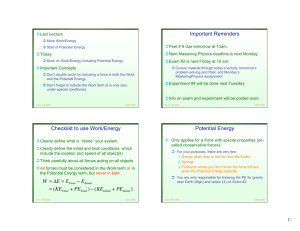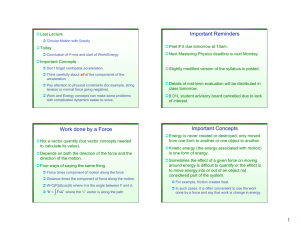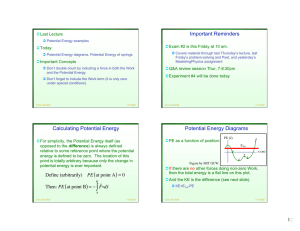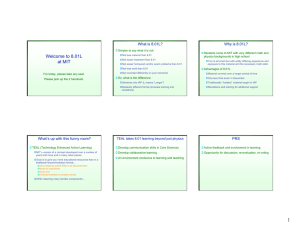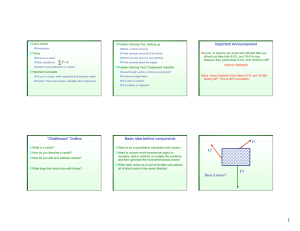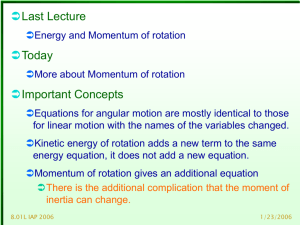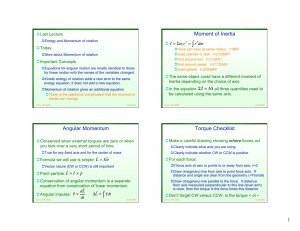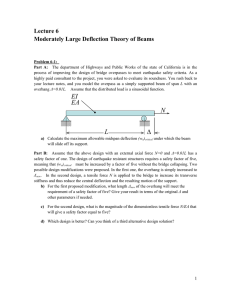) Important Reminders Blast from the Past (Early Exam Review
advertisement
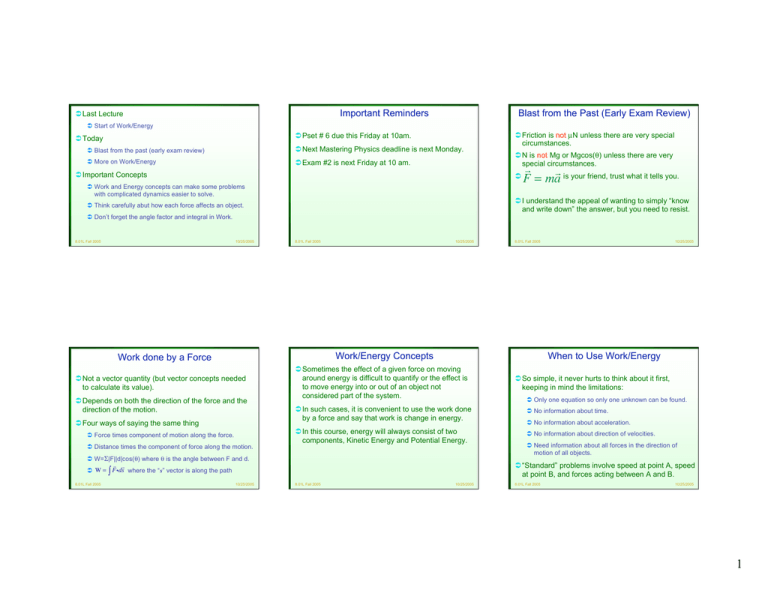
Important Reminders Last Lecture Blast from the Past (Early Exam Review) Start of Work/Energy Pset # 6 due this Friday at 10am. Today Blast from the past (early exam review) Next Mastering Physics deadline is next Monday. More on Work/Energy Exam #2 is next Friday at 10 am. Important Concepts Friction is not µN unless there are very special circumstances. N is not Mg or Mgcos(θ) unless there are very special circumstances. Work and Energy concepts can make some problems with complicated dynamics easier to solve. ! ! F = ma is your friend, trust what it tells you. I understand the appeal of wanting to simply “know and write down” the answer, but you need to resist. Think carefully abut how each force affects an object. Don’t forget the angle factor and integral in Work. 8.01L Fall 2005 10/25/2005 8.01L Fall 2005 10/25/2005 Work/Energy Concepts Work done by a Force Not a vector quantity (but vector concepts needed to calculate its value). Depends on both the direction of the force and the direction of the motion. Four ways of saying the same thing Force times component of motion along the force. Distance times the component of force along the motion. 10/25/2005 10/25/2005 When to Use Work/Energy Sometimes the effect of a given force on moving around energy is difficult to quantify or the effect is to move energy into or out of an object not considered part of the system. So simple, it never hurts to think about it first, keeping in mind the limitations: Only one equation so only one unknown can be found. In such cases, it is convenient to use the work done by a force and say that work is change in energy. No information about time. In this course, energy will always consist of two components, Kinetic Energy and Potential Energy. No information about direction of velocities. W=Σ|F||d|cos(θ) where θ is the angle between F and d. ! ! W = ! Fids where the “s” vector is along the path 8.01L Fall 2005 8.01L Fall 2005 No information about acceleration. Need information about all forces in the direction of motion of all objects. “Standard” problems involve speed at point A, speed at point B, and forces acting between A and B. 8.01L Fall 2005 10/25/2005 8.01L Fall 2005 10/25/2005 1 Checklist to use Work/Energy Potential Energy Clearly define what is “inside” your system. Clearly define the initial and final conditions, which include the location and speed of all object(s) Think carefully about all forces acting on all objects All forces must be considered in the Work term or in the Potential Energy term, but never in both. W = !E = EFinal " EInitial = (KEFinal + PEFinal ) " (KEInitial + PEInitial ) 8.01L Fall 2005 10/25/2005 Calculating Potential Energy - I Potential Energy In general, this is another form of real energy, for example in Einstein’s theory of gravity. For your purposes, just think of it as another way to quantify the effect of a force on an object. Only applies for a force with special properties. Using Potential Energy instead of Work for these special forces greatly simplifies calculations. Especially helpful to get the +/- signs correct. 8.01L Fall 2005 10/25/2005 Must be able to both take energy out from and put energy back into an object (negative and positive work) Total work is zero if the endpoint and starting point of a motion are the same. For your purposes, there are very few: Gravity (both near to and far from the Earth) Springs Problems where you don’ t know the force but are given the Potential Energy explicitly. 8.01L Fall 2005 Calculating Potential Energy - II Only the change in potential energy is important. !U = !PE = PE ( at point B) " PE ( at point A ) ! ! !PE = " # Fids B A For simplicity, the Potential Energy itself (as opposed to the difference) is always defined relative to some reference point where the potential energy is defined to be zero. The location of this point is totally arbitrary because only the change in potential energy is ever important. Define (arbitrarily) PE ( at point A ) = 0 8.01L Fall 2005 Clearly define what is “inside” your system. Clearly define the initial and final conditions, which include the location and speed of all object(s) Think carefully about all forces acting on all objects All forces must be considered in the Work term or in the Potential Energy term, but never in both. W = !E = EFinal " EInitial = (KEFinal + PEFinal ) " (KEInitial + PEInitial ) A 10/25/2005 10/25/2005 Checklist to use Work/Energy B ! ! Then: PE ( at point B) = ! " Fids 8.01L Fall 2005 Only applies for a force with special properties: 10/25/2005 8.01L Fall 2005 10/25/2005 2
